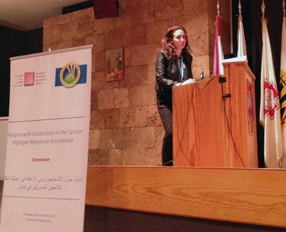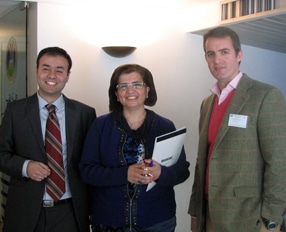
Within the framework of its response to the humanitarian crisis in Syria, FPSC joined efforts with the University of Balamand in Beirut to organize on March 20th the Symposium: Persons with Disabilities in the Syrian Refugee Response in Lebanon.
The meeting aimed at raising the awareness among the humanitarian organizations, Public institutions, UN agencies and NGOs involved in the Syrian humanitarian response, on the necessity to mainstream Persons with Disabilities’ (PwD) needs within the programming. Experts from UN agencies and NGOs debated on the needs and prospective actions for PwDs within the current emergency.
 In its first part, the symposium provided an opportunity for humanitarians to feed the discussion with the achievements and challenges faced in their undertaking. It also allowed exploring how the various actors could better catch and involve PwDs.
In its first part, the symposium provided an opportunity for humanitarians to feed the discussion with the achievements and challenges faced in their undertaking. It also allowed exploring how the various actors could better catch and involve PwDs.
Furthermore, the symposium called the attention of participants on the need to secure the collective commitment of the Government of Lebanon, UN agencies and NGOs to play an active role, as duty bearers, in assuring the inclusion of PwDs in the humanitarian response. In fact, the second part of the symposium addressed the actions to be undertaken in order to mainstream PwDs needs in the humanitarian response, resulting in ten main recommendations that will be shared with all relevant stakeholders.
The following 10 points summarize the recommendations of the Symposium:
- Consult persons with disabilities on their actual needs, priorities and aspirations, with the aim to enhance the shift from disability to ability.
- Include the types of disabilities in Registration forms to make the identification of PwD easier, and train registration officers on their use.
- A Mapping of services, regions of intervention and types of disabilities is required in order to be able to better cover the gaps in terms of service delivery.
- Strive as much as possible to secure appropriate and adapted housing settlement for the persons with physical disability in terms of accessibility (in and out of the dwelling, latrines, etc) and in terms of privacy.
- Improve physical accessibility to assistance and services through the adaptation of the services’ premises (ex: the Social Development Centres (SDCs) in the regions).
- Support local NGOs working with persons with disabilities (PwDs) and the structures offering specialized services (rehabilitation services, mobility aids….); Continue to support existing actors working for persons with disabilities (more importantly children with disabilities) whether in Health, Education, Nutrition, WASH and Child Protection.
- Support inclusiveness of special needs students in public schools. At the same time, reduce the disability mainstreaming urge in education (as many students are better off in specialized institutions).
- Establish an effective coordination between the DaOAWG (Disability & Older Age Working Group) and the Ministry of Social Affairs (MoSA) since the main Governmental body in charge of the humanitarian response to the crisis of refugees from Syria is MoSA.
- Make use of the existing resources that are available to build long lasting and more sustainable solutions to the barriers that persons with disabilities are facing to their inclusion.
- Sensitise and build the capacity of humanitarian actors to identify and include persons with specific needs in the humanitarian response actions.

